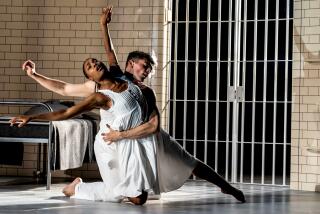Nothing’s Left Out of Feverish ‘Love Songs’
- Share via
In its California premiere Friday at UCLA, David Rousseve’s full-evening “Love Songs” provided a comprehensive index to all the thematic and stylistic preoccupations of ‘90s dance theater. Beginning with a pantomime passage in which a mother smothered her child out of love “in a world that was vile,” Rousseve launched a sprawling, text-driven narrative crammed with slow-motion sex and violence, plantation-era racism, AIDS awareness, gender issues, star-cross’d lovers, opera arias, nudity, puppetry, nontraditional casting, contemporary stand-up comedy, postmodern choreography, “y’all come” community participation and a fat showpiece role for himself as the many-voiced narrator.
Call it Theater of Opportunism 101, if you like; it aims to include everything, be everything, push every button, with arias by Puccini, Wagner and Saint-Saens pumped in to enforce the feverish gush of its storytelling. Obviously, all the operatic lyricism proves effective--just about any text, including this review, would sound infinitely more soothing when backed by the humming chorus from “Madama Butterfly.” But when local audiences have recently seen the brilliantly rhapsodic group dances that Paul Taylor created to Wagner’s “Siegfried Idyll,” it’s a big letdown to find Rousseve killing off his heroine in prosaic silent-film pantomime to the sublime “Liebestod,” or using the mighty prelude to “Tristan und Isolde” for generalized and derivative swoop-and-swirl choreography. We’ve been here before--in better company.
In the past, Rousseve anchored and unified his eclecticism through the authenticity of his own experience and that of his ancestors, digging deep and coming up with the haunting “Urban Scenes/Creole Dreams” and other personal epics. But in “Love Songs,” he merely gives us a disjointed cotton-field “Romeo and Juliet” as retold by a glib Anna Deveare Smith wannabe, preserving not only the basic plot elements but the theme that underpins it from Shakespeare to “West Side Story”: the oppressive day versus the liberating night.
There’s even an anguished “R&J;”-style dance duet with a dead body--though here the sequence exists in limbo outside the main story line and, more significantly, can’t begin to match the fierce originality that choreographer Angelin Preljocaj brought to his dead-body duet or any other part of his contemporary retelling of “Romeo and Juliet” on this same Royce Hall stage last season.
*
“Love Songs” also closely resembles Bill T. Jones’ “Last Supper at Uncle Tom’s Cabin/The Promised Land” in its sexual politics, the way it ricochets from slavery-era melodrama to contemporary commentary and also its use of a troop of local volunteers for added spectacle. But Rousseve is no stage director--his extras represent one more example of clutter on a stage simultaneously overloaded and impoverished, with dangling chandeliers, arched window-units and a hillock platform coming and going uselessly all evening long.
He and his fine six-member company Reality work hard to sustain the cycle of corn-pone homilies intercut with scenes of rape and mutilation, and it helps that everyone--male and female, black and white--takes turns playing the evil master and the enslaved lovers. Julie Tolentino Wood cuts to the heart of every role, making each statement in speech or motion an essential moment, unlike Rousseve, who sometimes gets lost in his own cleverness.
It’s no pleasure to watch a major artist make such a wrong turn from the specific and inimitable to the generic and all-too-familiar. But in one respect, at least, Rousseve remains on track. During the same week in which Matthew Bourne’s powerful update of “Swan Lake” won five Tony nominations--and Peter Martins’ passionless retread of “Swan Lake” reached television audiences--the gulf between form and content has never been clearer in the dance world. And Rousseve knows where he belongs.
If nothing else, “Love Songs” feeds our neo-Romantic hunger for a theater of feeling, for connection to the past, for resolving all the differences that keep us apart. Rousseve seems to yearn for it all just as much as anyone--but his creative evasions and role-playing subterfuges betray him. He dedicates “Love Songs” to those “who continue to teach me about love.” Great. Now all he needs is someone to teach him about putting that love on the stage, in his own voice, without undue reliance on Shakespeare, Anna Deveare Smith, Bill T. Jones or the entire standard repertory of the Metropolitan Opera.
More to Read
The biggest entertainment stories
Get our big stories about Hollywood, film, television, music, arts, culture and more right in your inbox as soon as they publish.
You may occasionally receive promotional content from the Los Angeles Times.









